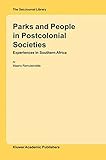Parks and People in Postcolonial Societies : Experiences in Southern Africa / by Maano Ramutsindela.
Tipo de material: TextoSeries GeoJournal Library ; 79Editor: Dordrecht : Springer Netherlands, 2005Descripción: vii, 191 páginas recurso en líneaTipo de contenido:
TextoSeries GeoJournal Library ; 79Editor: Dordrecht : Springer Netherlands, 2005Descripción: vii, 191 páginas recurso en líneaTipo de contenido: - texto
- computadora
- recurso en línea
- 9781402028434
- GF1-900
Springer eBooks
Society-Nature Dualism and Human Gradation -- The Imprint of Imparkation in Southern Africa -- The Consequences of National Parks -- New Nations and Old Parks -- (Dis)Continuities: Property Regimes in Nature Conservation -- Searching for a People-Nature Matrix -- The Packaging of Community Benefits -- Transfrontier Parks: New Regimes and Old Practices -- Conclusion: Science and (Trans)National Parks -- Postscript: the Durban Accord and the Next Ten Years.
Against the background of colonial and postcolonial experiences, this volume shows that power relations and stereotypes embedded in the original Western idea of a national park are a continuing reality of contemporary national and transnational parks. The volume seeks to dispel the myth that colonial beliefs and practices in protected areas have ended with the introduction of ‘new’ nature conservation policies and practices. It explores this continuity against the backdrop of the development of the national park idea in the West, and its trajectories in colonial and postcolonial societies, particularly southern Africa. This volume analyses the dynamic relations between people and national parks and assesses these in southern Africa against broader experiences in postcolonial societies. It draws examples from a broad range of situations and places. It reinserts issues of prejudices into contemporary national park systems, and accounts for continuities and interruptions in national parks ideals in different contexts. Its interpretation of material transcends the North-South divide. This volume is accessible to readers from different academic backgrounds. It is of special interest to academics, policymakers and Non-Governmental Organisations. This book can also be used as prescribed or reference material in courses taught at university.
Para consulta fuera de la UANL se requiere clave de acceso remoto.


